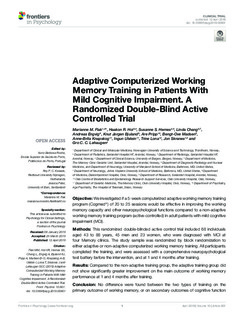| dc.contributor.author | Flak, Marianne Møretrø | |
| dc.contributor.author | Hol, Haakon Ramsland | |
| dc.contributor.author | Hernes, Susanne M S | |
| dc.contributor.author | Chang, Linda | |
| dc.contributor.author | Engvig, Andreas | |
| dc.contributor.author | Bjuland, Knut Jørgen | |
| dc.contributor.author | Pripp, Are Hugo | |
| dc.contributor.author | Madsen, Bengt-Ove | |
| dc.contributor.author | Knapskog, Anne Brita | |
| dc.contributor.author | Ulstein, Ingun | |
| dc.contributor.author | Lona, Trine Eli.B. | |
| dc.contributor.author | Skranes, Jon Sverre | |
| dc.contributor.author | Løhaugen, Gro | |
| dc.date.accessioned | 2019-10-01T08:44:58Z | |
| dc.date.available | 2019-10-01T08:44:58Z | |
| dc.date.created | 2019-06-20T11:14:23Z | |
| dc.date.issued | 2019 | |
| dc.identifier.citation | Frontiers in Psychology. 2019, 10:207, . | nb_NO |
| dc.identifier.issn | 1664-1078 | |
| dc.identifier.uri | http://hdl.handle.net/11250/2619532 | |
| dc.description.abstract | Objective: We investigated if a 5-week computerized adaptive working memory training program (Cogmed®) of 20 to 25 sessions would be effective in improving the working memory capacity and other neuropsychological functions compared to a non-adaptive working memory training program (active-controlled) in adult patients with mild cognitive impairment (MCI).
Methods: This randomized double-blinded active control trial included 68 individuals aged 43 to 88 years, 45 men and 23 women, who were diagnosed with MCI at four Memory clinics. The study sample was randomized by block randomization to either adaptive or non-adaptive computerized working memory training. All participants completed the training, and were assessed with a comprehensive neuropsychological test battery before the intervention, and at 1 and 4 months after training.
Results: Compared to the non-adaptive training group, the adaptive training group did not show significantly greater improvement on the main outcome of working memory performance at 1 and 4 months after training.
Conclusion: No difference were found between the two types of training on the primary outcome of working memory, or on secondary outcomes of cognitive function domains, in this sample of MCI patients. Hence, the hypothesis that the adaptive training program would lead to greater improvements compared to the non-adaptive training program was not supported. Within group analyses was not performed due to the stringent RCT design. | nb_NO |
| dc.language.iso | eng | nb_NO |
| dc.publisher | Frontiers Media | nb_NO |
| dc.rights | Navngivelse 4.0 Internasjonal | * |
| dc.rights.uri | http://creativecommons.org/licenses/by/4.0/deed.no | * |
| dc.title | Adaptive computerized working memory training in patients with mild cognitive impairment. A randomized double-blind active controlled trial | nb_NO |
| dc.type | Journal article | nb_NO |
| dc.type | Peer reviewed | nb_NO |
| dc.description.version | publishedVersion | nb_NO |
| dc.source.pagenumber | 11 | nb_NO |
| dc.source.volume | 10 | nb_NO |
| dc.source.journal | Frontiers in Psychology | nb_NO |
| dc.identifier.doi | 10.3389/fpsyg.2019.00807 | |
| dc.identifier.cristin | 1706367 | |
| dc.description.localcode | Copyright © 2019 Flak, Hol, Hernes, Chang, Engvig, Bjuland, Pripp, Madsen, Knapskog, Ulstein, Lona, Skranes and Løhaugen. This is an open-access article distributed under the terms of the Creative Commons Attribution License (CC BY). The use, distribution or reproduction in other forums is permitted, provided the original author(s) and the copyright owner(s) are credited and that the original publication in this journal is cited, in accordance with accepted academic practice. No use, distribution or reproduction is permitted which does not comply with these terms. | nb_NO |
| cristin.unitcode | 194,65,15,0 | |
| cristin.unitname | Institutt for klinisk og molekylær medisin | |
| cristin.ispublished | true | |
| cristin.fulltext | original | |
| cristin.qualitycode | 2 | |

